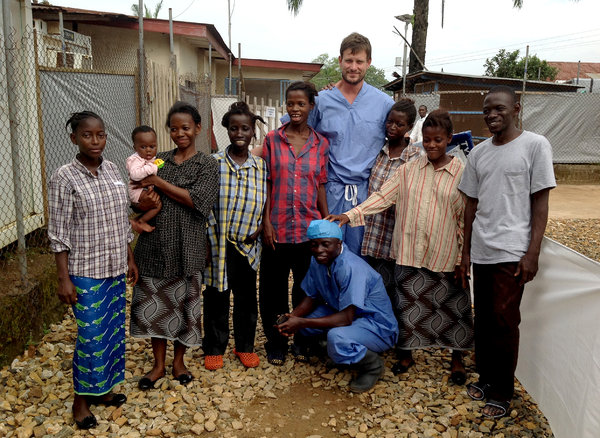Dr. Crozier, 44, contracted the disease in Sierra Leone while treating Ebola patients in the government hospital in Kenema. He was evacuated to Emory University Hospital in Atlanta on Sept. 9, the third American with Ebola to be airlifted there from West Africa. He had a long, agonizing illness, with 40 days in the hospital and dark stretches when his doctors and his family feared he might sustain brain damage or die. His identity was kept secret at his request, to protect his family’s privacy....Now, for the first time, he is speaking out. His reason, he said, is to thank Emory for the extraordinary care he received, and to draw attention to the continuing epidemic. He and his family granted their first interviews to The New York Times, and gave permission to interview his physicians.
The medical record, from an Ebola case, made for grim reading, but Dr. Ian Crozier could not put it down. Within days of the first symptom, a headache, the patient was fighting for his life. He became delirious, his heartbeat grew ragged, his blood teemed with the virus, and his lungs, liver and kidneys began to fail.
“It’s a horrible-looking chart,” Dr. Crozier said.
It was his own.
The viral load in his blood was extremely high, more than 100 times that of the other patients Emory had treated. And he was becoming delirious, a sign of encephalitis.
A nurse who had also been infected in Kenema, Will Pooley — whose evacuation Dr. Crozier had supervised — flew to Emory from England and donated several units of plasma. Survivors have antibodies that may help fight off the virus, and a number of patients have been given such transfusions. Dr. Crozier’s virus levels began dropping, but his kidneys failed, and he was connected to a dialysis machine. He had swelled up with 20 pounds of excess fluid, and all that his relatives could see through the window were tubes, machines and a bloated face they barely recognized. He had begun having abnormal heart rhythms. Doctors warned that he might not survive.
Continue reading the main story
He was on the ventilator for 12 days, and on dialysis for 24
Doctors say his recovery has taught them that aggressive treatments, even life-support measures like ventilators and dialysis, can save some Ebola patients. Dr. Bruce S. Ribner, who leads the Emory team, said that until recently the general practice was not to bother intubating Ebola patients or put them on dialysis, because if they got that sick they were going to die.
“One of the things Ian taught us was, guess what, you can get sick enough to need those interventions and you can still walk out of the hospital,” Dr. Ribner said. “I think it has sent a message to our colleagues around the world.”

